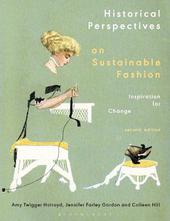
|
Historical Perspectives on Sustainable Fashion: Inspiration for Change
Hardback
Main Details
| Title |
Historical Perspectives on Sustainable Fashion: Inspiration for Change
|
| Authors and Contributors |
By (author) Dr Amy Twigger Holroyd
|
|
By (author) Jennifer Farley Gordon
|
|
By (author) Colleen Hill
|
| Physical Properties |
| Format:Hardback | | Pages:216 | | Dimensions(mm): Height 246,Width 189 |
|
| Category/Genre | Fashion and textiles - design
History of fashion |
|---|
| ISBN/Barcode |
9781350160446
|
| Classifications | Dewey:746.92 |
|---|
| Audience | | Tertiary Education (US: College) | |
|---|
| Edition |
2nd edition
|
| Illustrations |
100 bw illus
|
|
Publishing Details |
| Publisher |
Bloomsbury Publishing PLC
|
| Imprint |
Bloomsbury Visual Arts
|
| NZ Release Date |
6 April 2023 |
| Publication Country |
United Kingdom
|
Description
For centuries, the fashion industry has struggled to reconcile style with sustainability. In Historical Perspectives on Sustainable Fashion, you will be transported back in time to discover the historical dimensions of today's sustainable fashion movement. An array of success stories and cautionary tales provide both inspiration and warnings for the eco-conscious designer, encouraging an innovative approach that builds on predecessors' discoveries to move the practice of fashion forward. The 1st edition, Sustainable Fashion: Past, Present and Future, emerged from the Museum at FIT's groundbreaking exhibition 'Eco-Fashion: Going Green'. This revised edition broadens perspectives even further, incorporating eye-opening examples of designers, brands and activists working for change across the world today. Likewise, a new chapter examines the globalized mainstream fashion system and historical alternatives that provide compelling inspiration for reimagining the status quo. Fascinating and timely, Historical Perspectives on Sustainable Fashion examines progressive fashion through a historical lens, encouraging readers to question the state of the industry and demonstrating the value of historical insights in enabling and inspiring change.
Author Biography
Amy Twigger Holroyd is Associate Professor of Fashion and Sustainability in the School of Art & Design at Nottingham Trent University, UK. Jennifer Farley Gordon is an affiliate faculty member in the Apparel, Events & Hospitality Management department at Iowa State University, USA. She is also an independent researcher, writer, and curator, and formerly worked as an assistant curator at The Museum at the Fashion Institute of Technology (MFIT) in New York, USA. Colleen Hill is Curator of Costume and Accessories at the Museum at FIT in New York, USA.
ReviewsSucceeds in bringing together many of the themes and ideas around ethical fashion. (1st edition) -- Costume I have really valued this book since it was first published. It is well-written and accessible, but most importantly, through giving the historical perspectives, it shows the antecedents of the issues plaguing fashion now. -- Alice Payne, Queensland University of Technology, Australia The book is aimed at fashion students - its layout, photographs and pitch make it a successful academic text. It is a springboard from which they are invited to delve deeper into the subject. (1st edition) -- Hayley Mildren * Resource * The ecological issues of the present day are pressing and we do not have all the answers. By looking to the lessons of history, fashion designers, manufacturers, consumers and resistors can each gain a deeper understanding of how we got to where we are today, and how we might use past practices as a departure point for radical change and as a sourcebook of inspirational methods to refresh present-day thinking. Through a clear structure, covering Materials and Process, Design and Manufacture, Reuse and Recycling, Labour Practices, and Treatment of Animals, the authors construct a usable past of origin stories and contemporary parallels in the production and consumption of clothing. The historical research sits alongside museum examples of surviving garments, while the contemporary debates engage with the latest arguments and the freshest responses to the urgent need to do fashion differently. By the close of the final chapter, which looks at fashion systems in the round, and encourages imaginative and speculative thinking, readers will be inspired to take up history's gauntlet and find new solutions to fashion's enduring problems. - Annebella Pollen, Professor of Visual and Material Culture, University of Brighton, UK
|